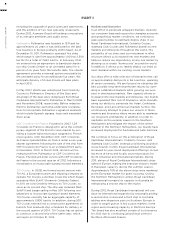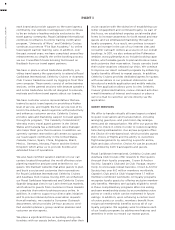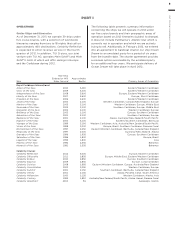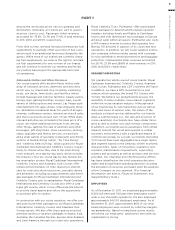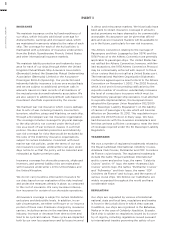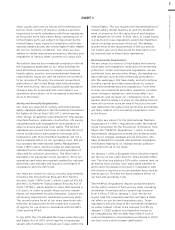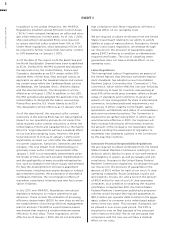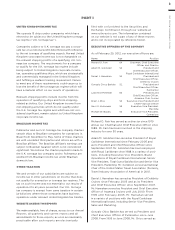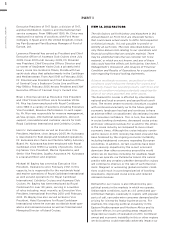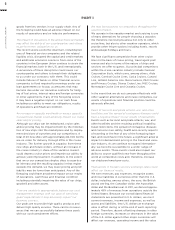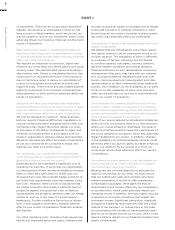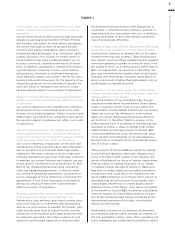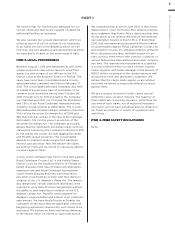Royal Caribbean Cruise Lines 2011 Annual Report Download - page 29
Download and view the complete annual report
Please find page 29 of the 2011 Royal Caribbean Cruise Lines annual report below. You can navigate through the pages in the report by either clicking on the pages listed below, or by using the keyword search tool below to find specific information within the annual report.
PART I
ROYAL CARIBBEAN CRUISES LTD. 25
We are also required by the United Kingdom, Norway,
Finland, and the Baltics to establish our financial
responsibility for any liability resulting from the non-
performance of our obligations to guests from these
jurisdictions. In the United Kingdom, we are currently
required by the Association of British Travel Agents to
provide performance bonds totaling approximately
£30.4 million. The Norwegian Travel Guarantee Fund
currently requires us to maintain performance bonds
of approximately $27.2 million to cover our financial
responsibility in Norway, Finland and the Baltics. We
are also required to pay to the United Kingdom Civil
Aviation Authority a non-refundable levy of £2.50
per guest where we arrange a flight as part of the
cruise vacation.
Certain other jurisdictions also require that we estab-
lish financial responsibility to our guests resulting
from the non-performance of our obligations; however,
the related amounts do not have a material effect
on our costs.
Regulations Regarding Protection of Disabled Persons
In 2010, the United States Department of Transporta-
tion issued regulations (the “New ADA Regulations”)
addressing various issues applicable to passenger
vessels under the American with Disabilities Act (the
“ADA”). Part I of the New ADA Regulations, which
include required reservation policies for disabled
guests and requirements for aids and services to
disabled passengers, became effective in January
2011. We are in compliance with Part I of the New
ADA Regulations and did not need to make any mate-
rial expenditures to comply. Part II, when issued, is
expected to address physical accessibility standards.
While we believe our vessels have been designed and
outfitted to meet the needs of our disabled guests,
we cannot at this time accurately predict whether we
will be required to make material modifications or
incur significant additional expenses in response to
Part II of the New ADA Regulations.
TAXATION OF THE COMPANY
The following is a summary of our principal taxes,
exemptions and special regimes. In addition to or
instead of income taxation, virtually all jurisdictions
where our ships call impose some tax or fee, or both,
based on guest headcount, tonnage or some other
measure.
We are primarily foreign corporations engaged in the
business of operating passenger cruise ships in inter-
national transportation. We also own and operate
other businesses primarily consisting of the land-tour
operation in Alaska and the Pullmantur land-tour and
air business.
UNITED STATES FEDERAL INCOME TAX
The following is a discussion of the application of the
United States federal and state income tax laws to us
and is based on the current provisions of the United
States Internal Revenue Code, Treasury Department
regulations, administrative rulings, court decisions and
the relevant state tax laws, regulations, rulings and
court decisions of the states where we have business
operations. All of the foregoing is subject to change,
and any such change could affect the accuracy of
this discussion.
Application of Section 883 of the
Internal Revenue Code
We and Celebrity Cruises, Inc. and many of our ship-
owning subsidiaries are engaged in a trade or business
in the United States, and in many cases, depending
upon the itineraries of the ships, receive income from
sources within the United States. Additionally, our
United Kingdom tonnage tax company, owned by us
and Celebrity Cruises, Inc., is a ship-operating com-
pany that may earn United States source income and
is a company for which an election was filed to be
classified as a partnership for United States federal
income tax purposes. Under Section 883 of the
Internal Revenue Code, certain foreign corporations
are not subject to United States federal income or
branch profits tax on United States source income
derived from or incidental to the international opera-
tion of a ship or ships, including income from the
leasing of such ships.
A foreign corporation will qualify for the benefits of
Section 883 if, in relevant part: (1) the foreign country
in which the foreign corporation is organized grants
an equivalent exemption to corporations organized in
the United States; and (2) the stock of the corporation
(or the direct or indirect corporate parent thereof)
is “primarily and regularly traded on an established
securities market” in the United States or another
qualifying country such as Norway. In the opinion of
our United States tax counsel, Drinker Biddle & Reath
LLP, based on the representations and assumptions
set forth in that opinion, we, Celebrity Cruises, Inc. and
our ship-owning subsidiaries qualify for the benefits
of Section 883 because we and each of those subsid-
iaries are incorporated in Liberia or Malta, which are
qualifying countries, and our common stock is primar-
ily and regularly traded on an established securities
market in the United States or Norway. If, in the
future, (1) Liberia or Malta no longer qualifies as an
equivalent exemption jurisdiction, and we do not
reincorporate in a jurisdiction that does qualify for
the exemption, or (2) we fail to qualify as a publicly
traded corporation, we and all of our ship-owning or
operating subsidiaries that rely on Section 883 for
tax exemption on qualifying income would be subject
to United States federal income tax on their United



